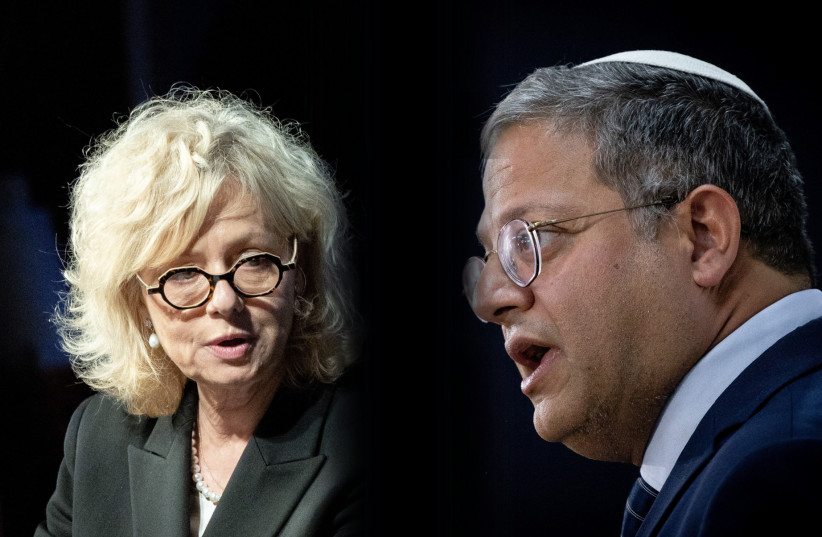The vague provisions of the Police Law create risk of politicization, but if interpreted properly the amendment can meet constitutional standards and avoid being struck down, the Attorney-General Gali Baharav-Miara said in an opinion on High Court of Justice petitions challenging the constitutionality of the legislation submitting law enforcement to the National Security Ministry.
"The amendment refers to the [national security] minister's authority vaguely, without establishing balances that ensure the professional independence of the police," wrote the Attorney-General's Office. "For these reasons there is a serious fear about the possibility of foreign interests in use of police force, about the politicization of the police and notably about the damaging of individual rights."
The Attorney-General said that the amendment had to be interpreted in a way that would avoid these concerns.
The letter said that the National Security Ministry would submit its own response to the High Court petitions. On May 15, The Attorney-General's office permitted Ben-Gvir to use private representation against the petition, which had been a point of tension between the two. Ben-Gvir said on March 13 that he did not trust Baharav-Miara to properly represent him.
The minister attacked the attorney-general's opinion on Wednesday, saying that while Baharav-Miara claimed that she doesn't interfere with government operations and tried to help ministers pursue their policies, this was not the case in practice.
Baharav-Miara "is trying to castrate the needed police ordinance amendment and neuter the minister's work," said Ben-Gvir. He said that this "proves how much a deep and fundamental reform of the legal system was needed, especially on the reform of the attorney-general."
Ben-Gvir said that the Police Law was important to fix problems in the law and to regulate the Israel Police with the ministry as required in a democratic state.
Petitioners welcome Baharav-Miara's decision
The Movement for Quality Government in Israel, one of the petitioners, welcomed the decision, which the NGO said illustrated many of the problems with the law and the excessive powers granted to the national security minister.
"Gone are the days when the government passed delusional laws that undermine the democratic basis of the State of Israel," said MQG. "We will not turn the other cheek, we'll fight with all our strength against this anti-democratic legislation -- in the court and in the street."
"Gone are the days when the government passes delusional laws that undermine the democratic basis of the State of Israel."
The Movement for Quality Government in Israel
On April 20 the Higher Arab Monitoring Committee and Adalah Center had also submitted petitions against the subordination of the police to the national security ministry arguing that it damaged the rule of law.
The NGOs argued that the amendments would remove the separation between police and the political branches, and that Ben-Gvir had used his powers already to push the police to engage in political action. In their petition, they gave the example of Ben-Gvir banning the waving of Palestinian flags in January judicial reform protests.
The Arab rights groups said that the national security minister's ability to set general policy and principles for the police could be abused to influence police operations, though the Attorney-General's office opined on Wednesday that minister had the authority to set such parameters prior to the amendments.
The Attorney-General's Office and Ben-Gvir have clashed on the limits of the minister's powers over the police. The High Court and Baharav-Miara have barred Ben-Gvir from issuing orders for ongoing police operations.
The High Court hearing on the petitions against the Police Law is set for Wednesday.

